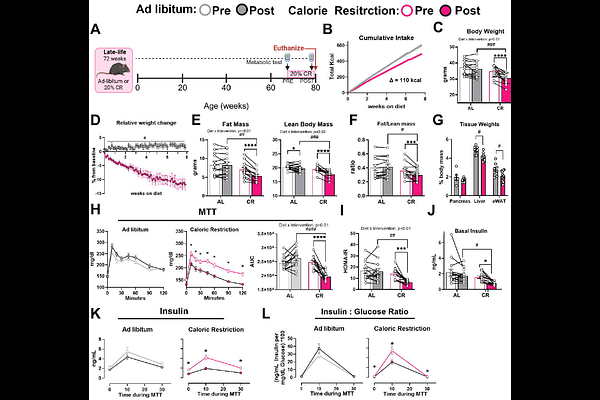Calorie restriction suppresses aging alpha cell pro-inflammatory signaling

Calorie restriction suppresses aging alpha cell pro-inflammatory signaling
Schleh, M.; Cambraia, A.; Cutler, M.; Ferguson, G.; Arrojo e Drigo, R.
AbstractAging is a major risk factor for insulin resistance and type 2 diabetes, driven in part by declining pancreatic beta cell function. While calorie restriction (CR) initiated early in life improves metabolic health and preserves beta cell function, its impact when initiated later in life remains unclear. We implemented a two-month, 20% CR intervention in 72-week-old male mice and assessed in vivo glucose homeostasis and beta cell function using meal tolerance tests, single cell RNA-sequencing, and confocal microscopy. We found that old mice exposed to CR have significantly improved glucose tolerance due to higher insulin sensitivity, which drives a two-fold reduction in glucose-stimulated beta cell insulin secretion. At the molecular level, CR enhanced beta cell proteostasis by downregulating ER stress pathways. Remarkably, CR reprogrammed the alpha cell transcriptome to suppress antigen presentation pathways and cytokine signaling pathways, including major histocompatibility complex class I (MHC-I) signaling. These transcriptional changes correlated with profound reduction in the density of adaptive immune cells in aging islets, including a near-complete loss of cytotoxic CD8+ T cells due to weakened intercellular communication between antigen-presenting cells with T and B lymphocytes. Importantly, aging human alpha cells from non-diabetic donors display similar proinflammatory phenotypes, including higher expression of MHC-I antigens that correlates with higher density of Cd8+ cells in aging human pancreases. Together, these findings demonstrate that CR remodels aging alpha and beta cell structure-function to modulate immune cell interactions in aging pancreases to mitigate age-related immune activation and islet inflammation.